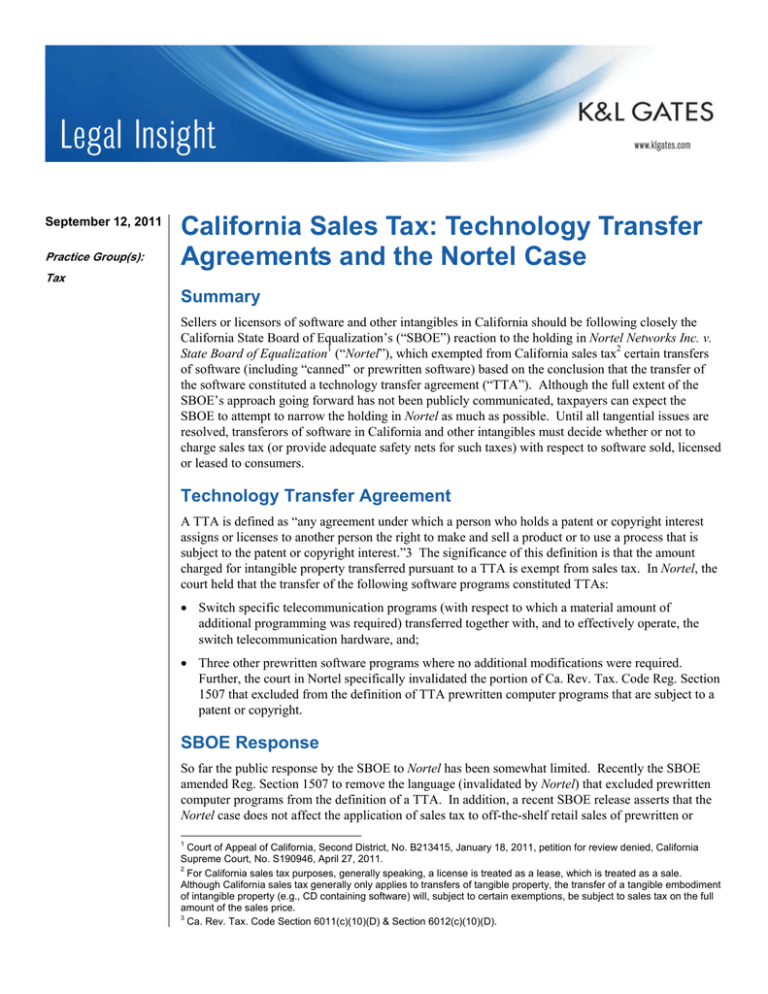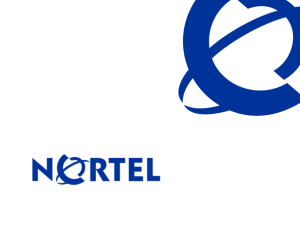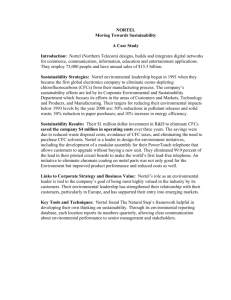California Sales Tax: Technology Transfer Agreements and the Nortel Case Summary
advertisement

September 12, 2011 Practice Group(s): California Sales Tax: Technology Transfer Agreements and the Nortel Case Tax Summary Sellers or licensors of software and other intangibles in California should be following closely the California State Board of Equalization’s (“SBOE”) reaction to the holding in Nortel Networks Inc. v. State Board of Equalization1 (“Nortel”), which exempted from California sales tax2 certain transfers of software (including “canned” or prewritten software) based on the conclusion that the transfer of the software constituted a technology transfer agreement (“TTA”). Although the full extent of the SBOE’s approach going forward has not been publicly communicated, taxpayers can expect the SBOE to attempt to narrow the holding in Nortel as much as possible. Until all tangential issues are resolved, transferors of software in California and other intangibles must decide whether or not to charge sales tax (or provide adequate safety nets for such taxes) with respect to software sold, licensed or leased to consumers. Technology Transfer Agreement A TTA is defined as “any agreement under which a person who holds a patent or copyright interest assigns or licenses to another person the right to make and sell a product or to use a process that is subject to the patent or copyright interest.”3 The significance of this definition is that the amount charged for intangible property transferred pursuant to a TTA is exempt from sales tax. In Nortel, the court held that the transfer of the following software programs constituted TTAs: Switch specific telecommunication programs (with respect to which a material amount of additional programming was required) transferred together with, and to effectively operate, the switch telecommunication hardware, and; Three other prewritten software programs where no additional modifications were required. Further, the court in Nortel specifically invalidated the portion of Ca. Rev. Tax. Code Reg. Section 1507 that excluded from the definition of TTA prewritten computer programs that are subject to a patent or copyright. SBOE Response So far the public response by the SBOE to Nortel has been somewhat limited. Recently the SBOE amended Reg. Section 1507 to remove the language (invalidated by Nortel) that excluded prewritten computer programs from the definition of a TTA. In addition, a recent SBOE release asserts that the Nortel case does not affect the application of sales tax to off-the-shelf retail sales of prewritten or 1 Court of Appeal of California, Second District, No. B213415, January 18, 2011, petition for review denied, California Supreme Court, No. S190946, April 27, 2011. 2 For California sales tax purposes, generally speaking, a license is treated as a lease, which is treated as a sale. Although California sales tax generally only applies to transfers of tangible property, the transfer of a tangible embodiment of intangible property (e.g., CD containing software) will, subject to certain exemptions, be subject to sales tax on the full amount of the sales price. 3 Ca. Rev. Tax. Code Section 6011(c)(10)(D) & Section 6012(c)(10)(D). California Sales Tax: Technology Transfer Agreements and the Nortel Case canned software based on the premise that the retailer does not hold a patent or copyright interest in the software.4 Taxpayers can also expect the SBOE to closely scrutinize transferors who are members of multi-entity affiliated groups where the transferor may not directly hold the patent or copyright because an IP holding company or other affiliated entity may hold those rights. Based on informal discussions, we understand that the SBOE is open to issuing rulings to taxpayers. In the absence of such a ruling, taxpayers must decide whether or not to charge sales tax and deal with concerns raised by customers who assert the tax should not apply. The pressure is even greater if a competitor is not charging sales tax. Taxpayers must properly document their transfer to help ensure qualification as a TTA and should also consider whether other exemptions are available with respect to transfers of software and other intangibles. Practical Considerations for Transferors Determine whether your transfer constitutes a TTA Ensure contracting entity is the holder of the copyright or patent Consider a ruling from the SBOE If in doubt, consider the following alternatives together with your customer: o Charge sales tax but immediately request a refund o Require specific indemnification/escrow in the event sales tax is not charged Ensure you properly document your transfer in order to enhance the probability of falling within the TTA exclusion Consider whether other exemptions are available (e.g. “remote telecommunication” or “load and leave”) Consider requesting refunds for prior transactions Circular 230 Notice: To ensure compliance with requirements imposed by the IRS, we inform you that any U.S. federal tax advice contained in this communication (including any attachments) is not intended or written to be used, and cannot be used, for the purpose of (i) avoiding penalties under the Internal Revenue Code of 1986, as amended or (ii) promoting, marketing or recommending to another party any transaction or matter addressed within. Authors: Gregory Hartker Greg.hartker@klgates.com +1.949.623.3518 Steve Freeman Stephen.freeman@klgates.com +1.949.623.3544 4 NR 66-11-H “Nortel Does Not Affect Sales Tax On Off-The-Shelf Software.” 2 California Sales Tax: Technology Transfer Agreements and the Nortel Case 3


